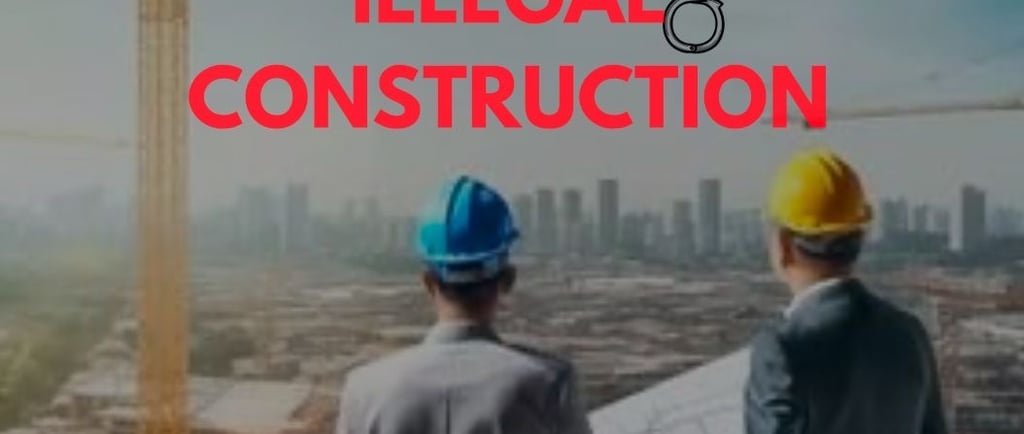No Licenses or Loans for Illegal Buildings; Officials Responsible for False Certificates: Supreme Court
Supreme Court has issued new guidelines to tackle unauthorized constructions, supplementing earlier directions on demolishing illegal structures. In a judgment by Justice Mahadevan, the Court upheld the High Court's decision, stating that illegal constructions cannot be allowed to exist in clear violation of the law.
12/18/20242 min read


Rajendra Kumar Barjatya & Another vs. U.P. Avas Evam Vikas Parishad & Others
Judges: Justices JB Pardiwala and R. Mahadevan
The Supreme Court issued a set of guidelines to prevent unauthorized constructions and ensure strict compliance with building regulations. These directions supplement earlier rulings on demolishing unauthorized structures. The Court emphasized that unauthorized constructions cannot be allowed to thrive and directed strict action against officials who allow such violations.
Guidelines:
Undertaking for Occupation Certificates:
Builders/applicants must provide an undertaking to ensure possession of the building is handed over to owners only after obtaining the completion/occupation certificate.
Display of Approved Plan:
The builder/developer must display a copy of the approved plan at the construction site throughout the construction period. Authorities should conduct periodic inspections and maintain records.
Completion/Occupation Certificate:
Authorities should issue completion/occupation certificates only after ensuring the construction adheres to the approved plan. If deviations are found, the issuance of certificates should be withheld until rectifications are made.
Service Connections:
Essential services like electricity, water, and sewerage will only be provided after presenting the completion/occupation certificate.
Post-Issuance Deviations:
If deviations are discovered after issuing a completion certificate, authorities must act immediately against the builder/owner/occupant. Officials who issued wrongful certificates should face departmental action.
No Licenses for Unauthorized Buildings:
Authorities must not grant business or trade licenses to unauthorized buildings, whether residential or commercial.
Compliance with Zonal Plans:
Developments must align with zonal plans and usage rules. Any modifications should strictly follow rules, considering public interest and environmental impact.
Inter-Departmental Cooperation:
Departments must cooperate promptly when requested by local bodies to act against unauthorized constructions. Any delays or failures will result in disciplinary actions.
Timely Resolution of Applications:
Appeals or applications for regularizing unauthorized constructions or addressing deviations must be resolved within 90 days.
Deterrence and Compliance:
Strict adherence to these and previous court directions will deter unauthorized constructions and reduce litigation related to building violations. State and Union Territory governments must issue circulars warning officials about the consequences of non-compliance.
Loans Against Buildings:
Banks and financial institutions should grant loans for buildings only after verifying the completion/occupation certificate.
Contempt and Prosecution:
Violating these directions will lead to contempt proceedings and prosecution under relevant laws.
The Court reiterated that these measures aim to curb unauthorized construction and ensure accountability.
Background
The Supreme Court was hearing an appeal against an order by the Allahabad High Court to demolish a building purchased by the appellants. The shops and commercial spaces in question were illegally constructed by Respondents No. 5 and 6 on land allotted by the U.P. Housing and Development Board (Respondent No. 1) without obtaining the necessary approvals.
The appellants opposed the demolition, arguing that they had occupied the property for a long time and claimed the authorities failed to issue prior notices to them.
Respondent No. 1 countered by stating that the construction violated residential zoning laws and lacked legal approvals. They highlighted that multiple notices had been sent to both the original allottees (Respondents No. 5 and 6) and the appellants, but no action was taken to address the violations. They also argued that delays or inaction by authorities do not justify illegal constructions.
Upholding the High Court's order, Justice Mahadevan emphasized that illegal constructions cannot be allowed to persist in clear violation of the law. The Court further clarified that long-term occupancy, financial investments, or administrative inaction do not make unauthorized structures legal.
The Court also directed that this judgment be circulated to all States and Union Territories.
